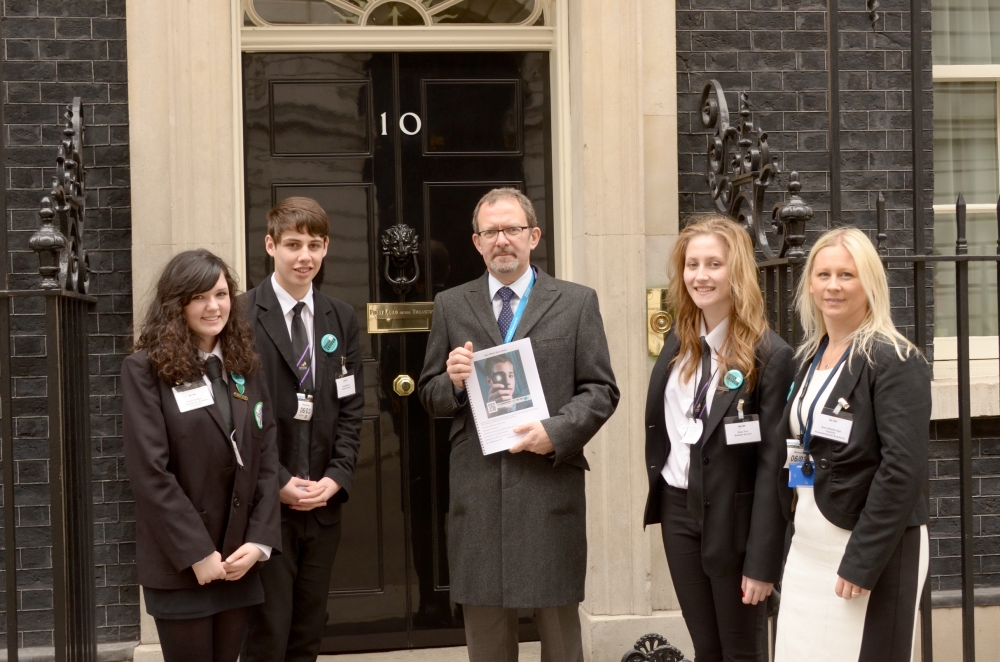North East school children represent the region at House of Commons
School children from the region have visited Number 10 and the House of Commons this week, representing thousands of North Easterners who are calling for tougher regulations around alcohol marketing.
The young people from Hummersknott Academy in Darlington and Boldon School presented their thoughts on alcohol marketing to MPs in the House of Commons before handing over more than 6,000 signatures from people in the North East calling for restrictions on advertising and sponsorship at Number 10 Downing Street.
The visit was part of the See What Sam Sees campaign by Balance, the North East Alcohol Office. The campaign highlights the fact that children and young people are under fire from a constant barrage of alcohol marketing which plays a huge role in creating a pro-alcohol environment for them to grow up in.
Central to the campaign was a film which followed Sam, a young boy, taking photographs of alcohol images during a normal day in his life. It also included a petition calling for the introduction of regulations to:
- Prevent alcohol advertisements from targeting children and young people
- Prevent alcohol advertisements from being shown on TV and in the cinema for under 18 certificate films
- Prevent alcohol advertisements from being shown through social networking sites
- Prevent alcohol sponsorship of sporting and youth events.
The young people presented to MPs including David Milliband, Ian Lavery, Catherine McKinnell, Mary Glindon, Jenny Chapman and Tracy Crouch about how they feel alcohol advertising is affecting young people in the North East. The pupils had also emulated ‘Sam’ and had taken pictures of any alcohol advertisements they saw in their everyday lives.
They also discussed how it made them feel, with pupils saying that they saw alcohol advertising ‘on the television, Youtube, Facebook, supermarkets, pubs’ and ‘magazines, bus stops, billboards, the internet’. They also said it made them feel that ‘alcohol is fun and you can’t have a good time if you don’t have a drink’.
Colin Shevills, Director of Balance, said: “Here in the North East we already have an unhealthy relationship with alcohol and the danger is that it will continue to run into the next generation. We have the highest rate of highest alcohol specific hospital admissions for under 18s and highest rates of under 18s in treatment – this needs to change.
“Sadly we live in a society where alcohol is too heavily promoted, too available and too affordable. It has become a dangerous part of our culture and it is obvious that the next generation is already being influenced by alcohol marketing at an early age.
“The UK is amongst the most relaxed in Europe in terms of regulation. And alcohol marketing in the UK is currently controlled by a number of codes of practice, drinks companies have been able to consistently sidestep these rules and continue to link their products with attractive and exciting situations and lifestyles.
“A recent European study showed that 10-15 year olds see 10% more alcohol ads on TV than adults and 50% more alcopop specific advertising than adults. We believe, along with thousands of people in the North East, that more effective controls are needed to ensure that alcohol is marketed responsibly – and in particular that alcohol marketing messages only reach adults.”
The event was sponsored by Jenny Chapman MP. She said: “These young people were an absolute credit to the town of Darlington and the North East and I was really impressed with the way in which they articulated their views and made their opinions known. It was a pleasure to welcome them to the House and hear at first-hand their experiences of advertising targeted at young people.”
Consumption of alcohol at a young age can have a devastating effect on physical and mental development and can lead to a range of health issues. There are health risks such as dehydration, nausea, vomiting, anxiety and even loss of consciousness and alcohol poisoning.
Drinking alcohol from an early age can also have a major impact on the brain, particularly the white matter, which can affect 18 parts of the brain. Abnormalities in the white matter can affect our ability to think, to process information, function emotionally and make decisions.
Alcohol consumption also leads to poor decision making and risk-taking behaviour, making young people even more vulnerable. It is linked to an increased risk of accident and injury and a greater likelihood of being involved in crime –as a victim or an offender.
